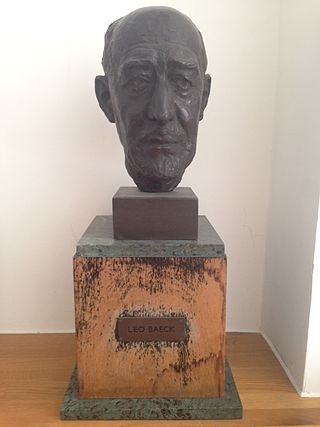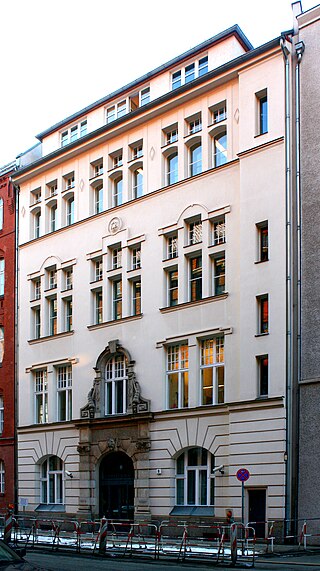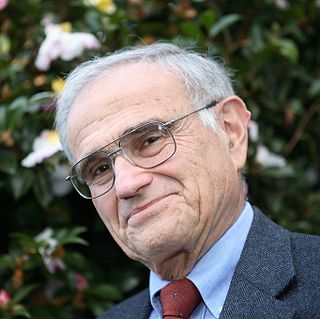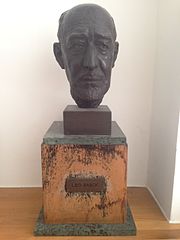
Leo Baeck was a 20th-century German rabbi, scholar, and theologian. He served as leader of Reform Judaism in his native country and internationally, and later represented all German Jews during the Nazi era. After the Second World War, he settled in London, in the United Kingdom, where he served as the chairman of the World Union for Progressive Judaism. In 1955, the Leo Baeck Institute for the study of the history and culture of German-speaking Jewry was established, and Baeck was its first international president. The Leo Baeck Medal has been awarded since 1978 to those who have helped preserve the spirit of German-speaking Jewry in culture, academia, politics, and philanthropy.

The World Union for Progressive Judaism (WUPJ) is the international umbrella organization for the various branches of Reform, Liberal and Progressive Judaism, as well as the separate Reconstructionist Judaism. The WUPJ is based in 40 countries with 1,275 affiliated synagogues, of which 1,170 are Reform, Progressive, or Liberal and 105 Reconstructionist. It claims to represent a total of some 1.8 million people, both registered constituents and non-member identifiers. The WUPJ states that it aims to create common ground between its constituents and to promote Progressive Judaism in places where individuals and groups are seeking authentic, yet modern ways of expressing themselves as Jews. It seeks to preserve Jewish integrity wherever Jews live, to encourage integration without assimilation, to deal with modernity while preserving the Jewish experience, and to strive for equal rights and social justice.
"Wissenschaft des Judentums" refers to a nineteenth-century movement premised on the critical investigation of Jewish literature and culture, including rabbinic literature, to analyze the origins of Jewish traditions.

Hochschule für die Wissenschaft des Judentums, or Higher Institute for Jewish Studies, was a rabbinical seminary established in Berlin in 1872 and closed down by the Nazi government of Germany in 1942. Upon the order of the government, the name was officially changed to Lehranstalt für die Wissenschaft des Judentums.

Ernst Akiba/Akiva Simon was a German-Jewish educator and religious philosopher.

Midrash HaGadol or The Great Midrash is a work of aggaddic midrash, expanding on the narratives of the Torah, which was written by David ben Amram Adani of Yemen.

Robert Weltsch was a journalist, editor and prominent Zionist.

Daniel Judah Elazar was a political scientist known for his seminal studies of political culture of the US states. He was professor of political science at Bar-Ilan University in Israel and Temple University in Pennsylvania, and director of the Center for the Study of Federalism at Temple University and the founder and president of the Jerusalem Center for Public Affairs.

Ludwig Philippson was a German rabbi and author.
The Leo Baeck Medal has been awarded since 1978 by the Leo Baeck Institute of New York City, an international research institute devoted to the study of the history and culture of German-speaking Jewry. It is the highest recognition the Institute bestows upon those who have helped preserve the spirit of German-speaking Jewry in culture, academia, politics, and philanthropy.

The Leo Baeck Institute, established in 1955, is an international research institute with centres in New York City, London, Jerusalem and Berlin, that are devoted to the study of the history and culture of German-speaking Jewry. The institute was founded in 1955 by a consortium of influential Jewish scholars including Hannah Arendt, Martin Buber and Gershom Scholem. The Leo Baeck Medal has been awarded since 1978 to those who have helped preserve the spirit of German-speaking Jewry in culture, academia, politics, and philanthropy.
The Bucerius Institute for Research of Contemporary German History and Society at the University of Haifa was founded in 2001. The institute was started by the ZEIT-Stiftung Ebelin und Gerd Bucerius and Professor Dres. h.c. Manfred Lahnstein. The institute is committed to the research of social and historical issues of contemporary Germany. The founder and first director of the institute was Prof. Yfaat Weiss. Since 2008, Prof. Amos Morris-Reich has been the director of the Bucerius Institute.

Werner van der Zyl was a rabbi in Berlin and in London, where he came in 1939 as a refugee rabbi from Germany. He was the prime mover and first director of studies of the Jewish Theological College of London. The college was inaugurated in 1956 and was renamed Leo Baeck College shortly afterwards at his suggestion.
The Jewish Restitution Successor Organization Inc. was founded in 1947 in New York by various American and international Jewish organizations. Originally, it was incorporated on May 15, 1947, as the Jewish Restitution Commission, but in 1948 changed its name to the Jewish Restitution Successor Organization at the request of American military authorities.

The Leo Baeck Institute New York (LBI) is a research institute in New York City dedicated to the study of German-Jewish history and culture, founded in 1955. It is one of three independent research centers founded by a group of German-speaking Jewish émigrés at a conference in Jerusalem in 1955. The other Leo Baeck institutes are Leo Baeck Institute Jerusalem and Leo Baeck Institute London, and the activities of all three are coordinated by the board of directors of the Leo Baeck Institute. It is also a founding partner of the Center for Jewish History, and maintains a research library and archive in New York City that contains a significant collection of source material relating to the history of German-speaking Jewry, from its origins to the Holocaust, and continuing to the present day. The Leo Baeck Medal has been awarded by the institute since 1978 to those who have helped preserve the spirit of German-speaking Jewry in culture, academia, politics, and philanthropy.

Hans Shmuel Beyth was a German Zionist activist. Between 1935 and 1945 he was a close aide of Henrietta Szold managing the Youth Aliyah, and from 1945 until his death in 1947 he was the leader of the organization in Palestine.

Otto Dov Kulka was an Israeli historian, professor emeritus of the Hebrew University of Jerusalem. His primary areas of specialization were the study of modern antisemitism from the early modern age until its manifestation under the National-Socialist regime as the "Final Solution"; Jewish thought in Europe – and Jews in European thought – from the 16th to the 20th century; Jewish-Christian relations in modern Europe; the history of the Jews in Germany; and the study of the Holocaust.
Michael Brenner is a German historian who researches and publishes on the history of Jews and Israel. Brenner has authored eight books on Jewish history, which were translated into twelve languages and is the editor and co-editor of eighteen books. He holds teaching positions at both the Ludwig Maximilian University of Munich and the American University.
The Leo Baeck Institute London is a research institute dedicated to the study of German-Jewish history, politics and culture, founded in 1955. It belongs to the international Leo Baeck Institute with further research centres in New York City, Berlin and Jerusalem.

Michael Albert Meyer is a German-born American historian of modern Jewish history. He taught for over 50 years at the Hebrew Union College-Jewish Institute of Religion in Cincinnati, Ohio. He is currently the Adolph S. Ochs Emeritus Professor of Jewish History at that institution. He was one of the founders of the Association for Jewish Studies, and served as its president from 1978–80. He also served as International President of the Leo Baeck Institute from 1992–2013. He has published many books and articles, most notably on the history of German Jews, the origins and history of the Reform movement in Judaism, and Jewish people and faith confronting modernity. He is a three-time National Jewish Book Award winner.













